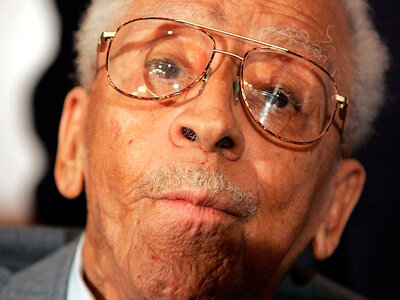Strange Fruit: Anniversary Of A Lynching
Eighty years ago, two young African-American men, Thomas Shipp and Abram Smith, were lynched in the town center of Marion, Ind. The night before, on Aug. 6, 1930, they had been arrested and charged with the armed robbery and murder of a white factory worker, Claude Deeter, and the rape of his companion, Mary Ball.
That evening, local police were unable to stop a mob of thousands from breaking into the jail with sledgehammers and crowbars to pull the young men out of their cells and lynch them.
News of the lynching spread across the world. Local photographer Lawrence Beitler took what would become the most iconic photograph of lynching in America. The photograph shows two bodies hanging from a tree surrounded by a crowd of ordinary citizens, including women and children. Thousands of copies were made and sold. The photograph helped inspire the poem and song "Strange Fruit" written by Abel Meeropol — and performed around the world by Billie Holiday.
But there was a third person, 16-year-old James Cameron, who narrowly survived the lynching.
The mob grabbed Shipp and Smith first — and then came back for Cameron. He had a noose around his neck when he made an improbable escape.
"After 15 or 20 minutes of having their pictures taken and everything, they came back to get me," Cameron told NPR in 1994. "Just then the sheriff, and he was sweating like somebody had throwed a bucket of water in his face. He told the mob leader: 'Get the hell out of here, you already hung two of 'em so that ought to satisfy ya.' Then they began to yell for me like a favorite basketball or football player. They said: 'We want Cameron, we want Cameron, we want Cameron.'
"And I looked over to the faces of the people as they were beating me along the way to the tree. I was pleading for some kind of mercy, looking for a kind face. But I could find none. They got me up to the tree and they got a rope and they put it around my neck. And they began to push me under the tree. And that's when I prayed to God. I said, 'Lord have mercy, forgive me my sins.' I was ready to die."
That's when some people say a local Marion citizen stood on the hood of his car and shouted, "He's innocent, he didn't do it."
Whatever the cause, the mob decided not to lynch Cameron and he was taken back to the jail.
Cameron was moved out of town, convicted as an accessory to the murder and served four years in jail.
But the case was never solved.
"We know that three young black men were at the scene of the crime. We know there was also a young white woman at the scene of the crime. Who pulled the trigger, who shot Claude Deeter is not known. And I don't think really can be known," says historian Jim Madison at Indiana University.

Joe Raedle/Getty Images
After the lynching, Cameron became a very devout man and vividly describes this day in his autobiographical account, A Time of Terror.
He believed that the voice that came from the crowd to save him was the voice of an angel.
He also went on to found three chapters of the NAACP, served as Indiana's State Director of the Office of Civil Liberties and founded America's Black Holocaust Museum.
In 1993, the governor of Indiana, Evan Bayh, formally pardoned Cameron.
"When a traumatic event happens like that, it makes an indelible imprint on the mind," Cameron said. "But I told him, since Indiana had forgiven me, I, in turn, forgive Indiana."
Cameron died on June 11, 2006, at the age of 92. He is survived by his wife Virginia; three children, Virgil, Walter and Dolores Cameron; and numerous grandchildren.
Produced by Joe Richman and Anayansi Diaz-Cortes of Radio Diaries with help from Deborah George, Ben Shapiro, Samara Freemark and Annie Baer. Special thanks to James Madison, author of A Lynching in the Heartland; Virgil Cameron, son of the late James Cameron; the Indiana University-Purdue University archive; Wisconsin Public Television; and WHYY's Fresh Air for use of their 1994 interview with James Cameron.



No comments:
Post a Comment